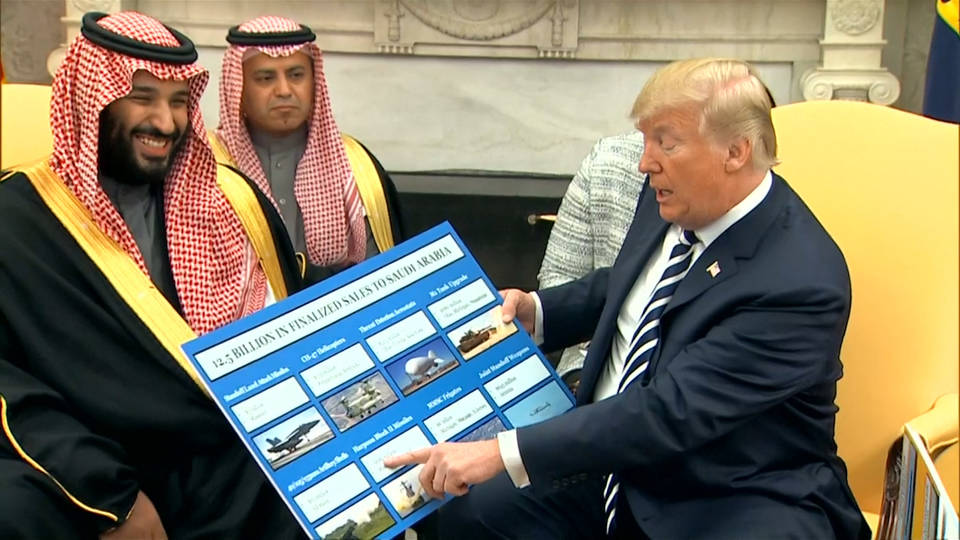
There would be no war in Yemen without American and British weapons. But Carolien Roelants sees no sign of movement toward terminating that assistance.
There is an unbelievable photo in which Donald Trump points out on a board the number of weapons he has sold to Saudi Arabia. “12.5 billion in finalized sales to Saudi Arabia,” reads the heading above photos of fighter jets, helicopters and warships. It is March 20, the scene is the White House, and the person with whom he is speaking is the crown prince of Saudi Arabia, who is laughing. A quintessential photo of a satisfied Trump; the businessman in him has closed a good deal.
What I don’t see on Trump’s board are the rockets and bombs that he has also sold for hundreds of millions of dollars to Saudi Arabia and other Gulf states that are waging war in Yemen against the Houthi rebels. Trump, and lest we forget, Barack Obama before him, are not the only arms suppliers. Europe is also actively involved, with the British, who are certainly bearing in mind the difficult economic future following Brexit, at the forefront. No, the Netherlands is not involved, as far as we know.
America First. Britain First. Yemen last. CNN discovered that on Aug. 9, an American bomb destroyed a bus transporting children in the province of Saada on a field trip. It was a laser-guided MK-82 bomb from Lockheed Martin. Fifty-one people died, among them 41 children. Initially, Saudi authorities argued that there was nothing illegal about the attack due to the fact that they had aimed at “Houthi leaders who recruit children.” But following gentle pressure from the United Nations Security Council, Saudi Arabia will now investigate the incident.
Investigate? Last week, Human Rights Watch published a 90-page report on the Saudi investigative body known as the Joint Incidents Assessment Team. “The investigators were doing little more than covering up war crimes,” according to HRW Middle East Director Sarah Leah Whitson. Out of 75 incidents that were investigated, the rules of engagement were found to have perhaps been violated in two of them. With respect to the others, according to JIAT, the attacks were either legitimate, or there was no attack, or a mistake was made. The bus attack will likely also appear to them to be legitimate, or at worst a mistake, just like the recent attack that killed another 22 children in Hodeida last week.
Back to the foreign bombs. CNN immediately pressed on and pointed out that in October 2016, 140 civilians were killed when a Raytheon bomb struck a funeral. The bombs that hit a market in Mastaba in April 2016, killing 97 people, including 87 civilians, were also from Raytheon, which states on its website that its precision weapons hit “the target and nothing else.” This confirms the suspicion that all of those thousands of civilians who are now dead were the target.
In addition to military equipment, America also supplies advisers and special forces. It helps with the selection of targets — as do the British — and makes refueling planes available. In both Washington and London, however, there is increasing discomfort among elected representatives with respect to this issue. After all, Washington and London could potentially be seen as complicit in war crimes.
There is no war without American support. Are you and I and Yemen thus headed toward a favorable end? No. Congress stashed a few vague conditions that military aid must comply with in the new defense budget. Thus, U.S. Secretary of State Mike Pompeo had to guarantee that Saudi Arabia and its allies would do their best to limit civilian casualties. Then came Trump. He removed all such conditions from the budget on Aug. 13 — after the bus bombing. But who cares? So many weapons can be sold if there is perpetual war.
Carolien Roelants is a Middle East expert and separates the facts from the hype here each week.

Leave a Reply
You must be logged in to post a comment.